Julio Cesar Chavez-Meldrick Taylor I remembered

There are certain fights throughout boxing history that ignite a visceral reaction. All that is needed to light the fuse are two hyphenated words.
Tunney-Dempsey II is one such fight. One side says that Tunney should have been counted out because he was on the floor for 14 seconds while others believe Dempsey’s failure to obey the newly-adopted “neutral corner” rule – and referee Dave Barry’s adherence to it – legitimately gave Tunney precious extra seconds to recover.
Mention “Leonard-Hagler” and the long knives come out. Fans of the “Marvelous One” say their man was robbed by judges who were dazzled by Leonard’s late-round bursts and blinded by his showmanship while Sugar Ray’s adherents point out that Hagler virtually ceded the first four rounds due to ineffective aggression and didn’t win enough of the remaining stanzas to merit the decision.
Even though Tunney and Dempsey are long dead and Leonard and Hagler are 58 and 60 years old respectively, the debates surrounding their fights burn as brightly as ever. Opinions on both sides are so deeply held that they almost become a part of that person. Like liberal versus conservative, a change of mind would be equated to an act of treason.
Another such fight took place 25 years ago today when Julio Cesar Chavez and Meldrick Taylor produced a war for the ages that would be overshadowed by one of the most polarizing decisions a referee ever made.
The moment Richard Steele waved his arms in front of Taylor’s face with just two seconds remaining in the scheduled 12-rounder three lives were instantly transformed. Taylor – who would have won a split decision had the final bell sounded – instead suffered his first defeat, a defeat that would set into motion a precipitous and ultimately ruinous decline. Conversely, Chavez escaped his first defeat and ran his record to 67-0. That historic unbeaten streak eventually stretched to 90 fights before Frankie Randall finally broke the string nearly four years later. For Steele, the effects weren’t immediately felt. At first he was hailed as a humanitarian who put Taylor’s long-term health over competitive considerations but after he stopped the first Mike Tyson-Donovan “Razor” Ruddock fight a year later, his actions in Chavez-Taylor I were used as the foundation for a negative narrative that would result in his getting vociferously booed for years afterward.
Taylor’s supporters contend their man should have been given the benefit of the doubt because of the short time remaining in the bout as well as his previous dominance while those who back Chavez (and Steele) argue the fight was stopped properly because a battered and momentarily distracted Taylor failed to properly respond to Steele’s direct questions.
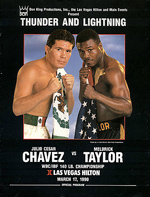 What is beyond question was that Chavez-Taylor I was a definitive example of what makes boxing such a compelling sport – constant two-way action, continuous shifts of fortune and an explosive conclusion.
What is beyond question was that Chavez-Taylor I was a definitive example of what makes boxing such a compelling sport – constant two-way action, continuous shifts of fortune and an explosive conclusion.
Up until that conclusion, the fight exceeded even the loftiest of expectations and in the wake of Buster Douglas’ mammoth upset of Mike Tyson a month earlier the sport couldn’t have asked for a more memorable entry into the 1990s.
This was a fight several years in the making and in the boxing world the anticipation was high. And why not? On paper, Chavez-Taylor I was as magnificent a pairing as could be made in the sport, both in terms of physical assets and the meshing of styles. On the former, at 5-foot-7 and owning a 66¾-inch reach Chavez held one-half inch edges in both categories, which virtually ensured that talent and courage, not overwhelming structural advantages, would identify the superior fighter that night.
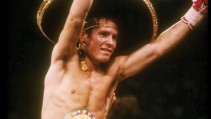 On the latter, while Chavez was capable of long-range boxing (see the Rocky Lockridge fight for proof), his reputation was built on aggression, determination, splendid infighting, pinpoint accuracy and a chin that rivals diamonds for its hardness. The Mexican was the latest personification of a national heritage that counts Ruben Olivares, Carlos Zarate, Pipino Cuevas and Vicente Saldivar among others as its heroes and his technical prowess served to further polish his country’s fistic status.
On the latter, while Chavez was capable of long-range boxing (see the Rocky Lockridge fight for proof), his reputation was built on aggression, determination, splendid infighting, pinpoint accuracy and a chin that rivals diamonds for its hardness. The Mexican was the latest personification of a national heritage that counts Ruben Olivares, Carlos Zarate, Pipino Cuevas and Vicente Saldivar among others as its heroes and his technical prowess served to further polish his country’s fistic status.
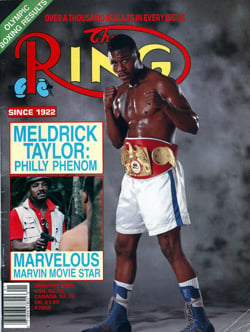 Like Chavez, Taylor represented a proud boxing fraternity – the Philadelphia Fighter. Like no other city in the United States, Philly fighters enjoy a unique identity. Shaped by gym wars that often were more brutal than most official fights, they possess all the technical skills anyone could want but no matter whether they were a boxer, puncher, cutie or mauler they executed their talents with an extra lust for combat that spectators could feel. Although Taylor possessed supersonic hand and foot speed, his temperament was that of a brawler who thirsted for tests of manhood. This mindset was what made him and in the end that’s what ended up breaking him.
Like Chavez, Taylor represented a proud boxing fraternity – the Philadelphia Fighter. Like no other city in the United States, Philly fighters enjoy a unique identity. Shaped by gym wars that often were more brutal than most official fights, they possess all the technical skills anyone could want but no matter whether they were a boxer, puncher, cutie or mauler they executed their talents with an extra lust for combat that spectators could feel. Although Taylor possessed supersonic hand and foot speed, his temperament was that of a brawler who thirsted for tests of manhood. This mindset was what made him and in the end that’s what ended up breaking him.
Each man was making the third defense of his respective 140-pound belt – Chavez the WBC and Taylor the IBF – but an even bigger prize was at stake. With Tyson’s defeat to Douglas the winner likely would rise to the number-one spot in the pound-for-pound rankings.
The indoor arena at the Las Vegas Hilton was filled to its 9,300-seat capacity and hotel officials estimated that 75 percent of the tickets were bought by Mexicans and Mexican-Americans backing Chavez. Those fans also helped drive up the odds in Chavez’s favor from 8-to-5 to 11-to-5.
HBO’s Jim Lampley concluded the pre-fight package by declaring “when champions meet, drama usually follows.” How right he turned out to be.
The fight began with Taylor flicking half-jabs and moving in small semi-circles in both directions while Chavez stalked behind winging hooks. Taylor’s comet-like fists easily penetrated Chavez’s guard as he landed 33 of his 92 punches while the Mexican, a notoriously slow starter, only mustered 27 punches and nine connects.
Chavez’s corner, accustomed to their fighter’s early sluggishness, sought to reinforce their strategic blueprint.
“You’ve got to respond immediately,” trainer Cristobal Rosas said through HBO interpreter Ruben Castillo. “Two jabs. You go first. You threw a good left hook. Work inside and don’t get frustrated. Don’t get excited.”
Meanwhile, Taylor’s corner of George Benton and Lou Duva were happy with their man’s performance and wanted to see more of the same.
“Just keep on making that little circle,” said Benton, who was referencing the small circle drawn in the middle of their training camp ring so that Taylor would stay off the ropes.
“Give me a little more snap on that jab,” Duva added.
The pattern continued in the second as Taylor fluidly circled and stabbed and Chavez advanced slowly but purposefully. Still, the frustration on Chavez’s part was evident: After Taylor easily avoided Chavez’s attempt to bull him into the ropes the veteran closed his eyes, then rolled them.
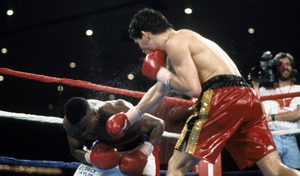 Chavez slipped in a short lead right that not only got a rare cheer from the crowd but also reopened a cut on Taylor’s lower lip that he had suffered in training. The injury sparked instant retaliation as Taylor banged two rights to Chavez’s hip, connected with a right uppercut-left hook to the face and landed a snappy hook off a Chavez miss.
Chavez slipped in a short lead right that not only got a rare cheer from the crowd but also reopened a cut on Taylor’s lower lip that he had suffered in training. The injury sparked instant retaliation as Taylor banged two rights to Chavez’s hip, connected with a right uppercut-left hook to the face and landed a snappy hook off a Chavez miss.
Taylor’s blood also spurred Chavez as he landed accurate one- and two-punch offerings. Three solid Chavez rights and a robust short-range hook crashed through Taylor’s defense in the final 20 seconds. For the first time in the fight the American appeared disturbed as he wiped at his face and blinked his eyes.
What no one knew at the time was that those rights fractured the orbital bone under Taylor’s left eye. As he stood in the corner for the start of round three, Taylor vigorously shook his head side to side to cope with the unusual sensations he felt in his face.
Both fighters upped their attacks in round three as Taylor’s bustling combinations carved Chavez’s guard while the WBC titlist continually threw right hand leads that mostly found air. Taylor even out-did Chavez in terms of body punching as he connected with multi-punch salvos while Chavez was limited to singular hammers. After tasting an at-the-bell right, a confident Taylor marched to his corner with arms upraised, convinced he had complete command of the early action.
The CompuBox statistics backed up that contention, for he led 287-116 in terms of thrown punches during the first three rounds and the disparity in landed punches appeared similar.
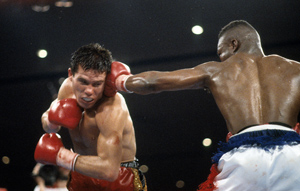 Taylor’s control continued in the fourth as his dazzling combinations pelted Chavez from all directions and his defensive reflexes easily avoided his opponent’s scuds. Chavez managed to land an occasional bomb but in terms of numbers and flow the young Pennsylvanian couldn’t have imagined a much better beginning. But while Taylor was in mathematical command, his body was paying a price.
Taylor’s control continued in the fourth as his dazzling combinations pelted Chavez from all directions and his defensive reflexes easily avoided his opponent’s scuds. Chavez managed to land an occasional bomb but in terms of numbers and flow the young Pennsylvanian couldn’t have imagined a much better beginning. But while Taylor was in mathematical command, his body was paying a price.
“Now you’re boxing beautiful!” Duva shouted as he wiped the blood from Taylor’s lower lip. Meanwhile, cut man Ace Marotta applied an ice bag to Taylor’s swelling left eye. Benton, a former fighter who experienced plenty in his 76-fight, 21-year career, was concerned about his fighter’s ability to maintain his hot pace.
“Settle down,” he said. “Don’t let the guy carry you too fast.”
Duva, perhaps sparked by memories of Pernell Whitaker’s scandalous decision defeat to Jose Luis Ramirez two years earlier, sang a different tune.
“You have to throw punches to back this guy up, Mel,” Duva added. “I don’t want this guy stealing the rounds from us, you hear?”
Round five produced a strategic turn as the action shifted to close quarters – Chavez’s turf. While Taylor continued to fire his missiles Chavez connected with his share of power shots while also bodying Taylor to create room for his vaunted body punches and compact blows over the top. With a minute remaining Chavez landed his best punch to date – a left hook that snapped Taylor’s head – and added several others to end the closest round of the early going.
Sensing his man was as much as five rounds down, cut specialist Jose “Buffalo” Martin brought out the verbal whip.
“We’ve lost this round!” he yelled. “We can’t afford to lose any more rounds! Throw punches with him; you can’t wait for him! You’re better than him, Julio! Throw punches until he falls on his bottom!”
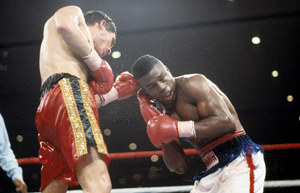 Chavez’s subtle rally continued in the sixth as a right hand during an exchange wobbled Taylor for the briefest of moments. Taylor wasn’t throwing nearly as many punches and his combinations lacked their previous sparkle. Also, because he wasn’t moving nearly as much, Taylor was an easier target for Chavez to strike. Finally, “J.C. Superstar” was starting to live up to his moniker and once the bell sounded he claimed his first outright round of the bout.
Chavez’s subtle rally continued in the sixth as a right hand during an exchange wobbled Taylor for the briefest of moments. Taylor wasn’t throwing nearly as many punches and his combinations lacked their previous sparkle. Also, because he wasn’t moving nearly as much, Taylor was an easier target for Chavez to strike. Finally, “J.C. Superstar” was starting to live up to his moniker and once the bell sounded he claimed his first outright round of the bout.
The damage to Taylor was only increasing; ice bags were applied to both eyes and a towel was used to wipe away the blood gushing from his mouth. Benton again warned Taylor not to fight at too fast a pace.
Taylor, of course, ignored that counsel in the seventh as he began the fight’s second half much as he did the first. A crisp hook followed by two thumping body shots landed flush but Chavez took each unflinchingly before driving in his own power hook to the body. That punch sparked an extended exchange at close quarters that highlighted Taylor’s volume and Chavez’s thunder. But once Taylor temporarily exhausted his supply, Chavez continued the unglamorous but highly effective task of wearing down his opponent by leaning in and working over Taylor’s head and body with heavy-handed ammunition.
But just as it appeared Chavez was building a solid foundation for a late-round rally, the Mexican suddenly turned boxer in the eighth. Curiously, Chavez bounced on his toes and circled Taylor, who proceeded to unleash a rapid-fire volley to which Chavez responded with a stony stare. Taylor won this round – by far the most uneventful of the fight – largely by default.
Chavez’s inaction lit a fuse within Martin, who appeared to be on the edge of having a coronary.
“You’re standing too straight up!” he screamed. “Do it for your family! Give it all your heart! You’ve got to give it all you got! For the love of God, throw everything you’ve got!”
The good news was that Chavez turned up the action in the ninth. The bad news for Chavez was that Taylor did too. Taylor whipped in dynamite combinations that threatened to overwhelm the Mexican but at 27, the youthful veteran weathered the mini-crisis and resumed his rock-handed work.
That work also was starting to pay dividends physically as well as mathematically. Chavez’s punches popped Taylor’s head and riddled his rib cage, all the while inflicting unseen but definitely-felt damage. Taylor responded to the pain with spurts of passion and velocity and the result was a breathtaking sequence of infighting.
Chavez’s corner was a far happier place, for it appeared their warrior had finally hit his stride and was poised to produce an inspired stretch drive.
“Go for the opportunity,” Martin said. “He’s slowing down. For your family.”
Taylor again launched an early attack in the 10th but he soon fell inside and subjected himself to another round of what made Chavez a boxing immortal. He slammed full-shouldered rights to the head and strung as many as three consecutive hooks, all of which landed with brutal force. Taylor’s body language involuntarily revealed his fatigue, which had two effects. First, it strengthened Chavez’s resolve and second, it swelled Taylor’s desire to fight off the avalanche for as long as possible.
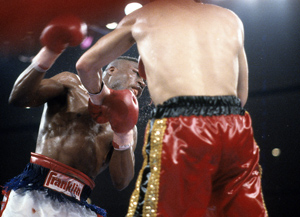 A right buckled Taylor’s legs and his upper body slumped forward as Chavez continued to belabor him with compact blows. Taylor’s legs no longer had their spring and for the first time it looked as if the IBF titlist was in danger of losing. The question now was whether Taylor had enough left in the tank to make it to the finish line, a finish line that, given his lead, promised a life-changing victory. But in the process he was absorbing life-changing punishment.
A right buckled Taylor’s legs and his upper body slumped forward as Chavez continued to belabor him with compact blows. Taylor’s legs no longer had their spring and for the first time it looked as if the IBF titlist was in danger of losing. The question now was whether Taylor had enough left in the tank to make it to the finish line, a finish line that, given his lead, promised a life-changing victory. But in the process he was absorbing life-changing punishment.
That dynamic wasn’t lost on the ring commentators.
“What’s going to be interesting in these next two rounds is to see how Taylor handles it because this is the toughest fight he’s ever been in,” HBO analyst Larry Merchant astutely observed as Round 11 began. “Whether there’s fatigue, whether he can stand up to this great champion who is just not going to give up.”
Knowing the end was in sight the two gladiators continue to pound each other with fury and purpose and neither was willing to cede anything to the other. But Taylor’s speed no longer was an impediment to Chavez’s punishing work as he spun the American’s head with a savage right, then a hook moments later. The drama built with every passing second and as the bell rung one had to wonder how this violent symphony would conclude.
During the final rest period, Chavez knew, despite his rally, that his historic winning streak – the fourth longest in history to start a career – remained in mortal jeopardy. Entering the final round he trailed badly on two cards (108-101 and 107-102) while leading 105-104 on the third, which meant that Chavez needed to produce something truly magical to snatch victory from defeat. It helped his cause that he had a woozy opponent in front of him, one that nearly walked toward the wrong corner following the 11th round bell.
“You’ve got to go for this round,” Martin said. “When the bell rings you’ve got to throw your punches.”
Though Duva and Benton suspected their charge was ahead they knew enough that the scorecards – especially in Las Vegas – might indicate something different. Because of past experiences that left scars, the pair urged Taylor to go for the gusto instead of preserving the fruits of his early success.
“Mel, this is the last round,” Duva said. “The whole fight is hanging on this round. Do you want to be champion of the world?”
“You need this round,” Benton added, pointing his finger to drive home the sentiment.
Meanwhile, the exhausted Taylor was in a world of fatigue and pain mixed with ambition and resolve. All he needed to do was to last three more minutes and immortality was his. He forever would be known as the man who shattered Chavez’s undefeated record and he would be considered the best pound-for-pound fighter alive. That drive – along with the fervent instructions from his corner – would propel him to very unsafe places.
Despite his weakened state, Taylor dove inside and rumbled with the ultimate rumbler. Taylor fell to the canvas after missing with a wild hook, a sure indicator of how weary he was.
Curiously, Chavez showed no undue urgency. To the frustration of his corner and of his fans Chavez wasn’t seizing the moment in a way commensurate with the situation and by the halfway point it looked as if the Mexican just didn’t have it in him to pull out the fight.
With a minute remaining, however, that dynamic began to shift. A right hand shook Taylor to his core and lifted the crowd into an anticipatory frenzy. A clipping hook to the jaw caused Taylor to break into a fake wobble but Chavez wasn’t fooled as he connected with several more bombs, then backed away to survey the damage. It was as if he was waiting for the precise moment to launch his final attack and only he, the expert boxer, knew when that time would be.
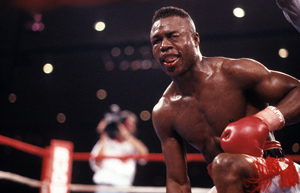 With 24 seconds remaining both men set themselves to throw rights. Chavez’s got there first and it got there with the most impact. Taylor’s body shuddered but instead of retreating he dove forward toward the corner pad. Chavez then pivoted hard, planted his feet and delivered a flush right to the face that sent Taylor crashing to the floor.
With 24 seconds remaining both men set themselves to throw rights. Chavez’s got there first and it got there with the most impact. Taylor’s body shuddered but instead of retreating he dove forward toward the corner pad. Chavez then pivoted hard, planted his feet and delivered a flush right to the face that sent Taylor crashing to the floor.
Just 16 seconds remained on the clock and the heavily Mexican crowd exploded in rapture at this dramatic turn of events. As Taylor regained his feet at Steele’s count of five, the red lights indicating the end of the round was near began flashing. Meanwhile, Chavez began walking toward his own corner – which, like Tunney-Dempsey II, should have prompted Steele to stop his count and order Chavez to return to the neutral corner. But Steele’s focus was rightly on assessing Taylor’s condition.
After counting “eight,” Steele placed his face inches from Taylor’s and yelled, “are you OK? Are you OK?” It was here that matters became even more complicated.
Taylor’s proper action would have been to nod demonstrably or say something – anything – to indicate to Steele that he was in full command of his faculties. At that critical moment, however, Duva climbed onto the ring apron, perhaps to complain about Chavez moving from the neutral corner. That caused Taylor to glance to his right instead of answering Steele, a division of attention that would prove disastrous. Because Taylor failed to adequately answer Steele at that very moment, the referee closed his eyes, raised his arms and waved off the fight.
Just like that – with just two seconds remaining – the fight was over.
“Unbelievable! Unbelievable!” Lampley yelled. “Richard Steele stopped the fight with fewer than five seconds to go. You’re going to watch Lou Duva go crazy now! You’re going to watch Lou Duva go absolutely berserk.”
Duva bounded into the ring, pointed his finger at Steele and spewed venom as only he could spew it. But his vitriol was drowned out by the massive din that erupted in the wake of Chavez’s miraculous turnaround. In one corner was exhilaration and exultation while in the other was fury and bitter disappointment.
The man at the center of the controversy was – and still remains – at peace with his decision.
“I stopped it because Meldrick had taken a lot of good shots, a lot of hard shots, and it was time for it to stop,” he said. “I’m not the timekeeper and I don’t care about the time. When I see a man that’s had enough, I’m stopping the fight. I asked him if he was all right and I didn’t hear him say a thing. But I was looking at his condition mainly. That’s what I was interested in.
“There’s no fight worth a man’s life,” he continued. “I don’t care what it is, or how many I do, when I get tired of seeing a man get pound, pound, pound, and I think he had enough, I’m going to stop it.”
Duva and Taylor, needless to say, didn’t buy the explanation. They believed that extenuating circumstances – the time remaining in the fight and the weight of the result – merited a higher standard that they believe should have resulted in a slower trigger.
“Forget that he didn’t know the time, they’ve got to give the guy a chance,” Duva asserted. “This is a title fight, he wasn’t getting hurt out there.”
“The fight was just two seconds from the 12th round,” Taylor said. “There’s no way in hell he should have stopped the fight with me leading on the scorecards going into the last round. He caught me with a good right hand. I got up and he didn’t say anything to me. He said, ‘are you OK?’ and he didn’t give me no kind of direction in the corner and he stopped the fight.
“I know I was ahead because I threw a lot cleaner shots, a lot more flurries,” he continued. “Even into the last round I got a little careless, exchanging punches instead of staying away with the jab. But still, the fight was that good that it should have went the 12 rounds. I most definitely want a rematch because this fight should have been mine, it should have been in the basket. I was leading on the scorecards. I don’t understand it.”
Chavez, victorious but worn out, had little to say in the wake of his incredible victory.
“I felt very, very tired,” he said through Castillo. “Meldrick’s a great fighter who’s a very quick fighter and an intelligent fighter. He deserves another opportunity.”
That opportunity wouldn’t come until four-and-a-half years later and both endured plenty in that time. Taylor had won and lost a 147-pound belt and suffered KO losses to Terry Norris and Crisanto Espana while Chavez’s aura of invincibility was badly compromised by Pernell Whitaker, then officially removed by Frankie Randall. Chavez regained his belt thanks to a rules technicality and the Taylor bout was the first defense of his second reign. Once again, Taylor sprinted to an early lead but Chavez eventually found his form and scored an eighth-round TKO.
As for Steele, Chavez-Taylor I would prove to be the first of a devastating one-two to his reputation. The “two” would take place a year and a day later when he suddenly stopped Tyson-Ruddock I in round seven. From that point forward Steele was perceived far differently, and, for a long time, far more hostilely.
Chavez and Steele eventually would earn enshrinement to the International Boxing Hall of Fame while Taylor fought on until 2002 and retired with a 38-8-1 record. For him, the two seconds that never happened delivered a blow that not even a thousand Chavezes could match. Not only did he lose a fight, he lost a legacy.
*
Lee Groves is a boxing writer and historian based in Friendly, W.Va. He is a full member of the BWAA, from which he has won 12 writing awards, including nine in the last four years and two first-place awards since 2011. He has been an elector for the International Boxing Hall of Fame since 2001 and is also a writer, researcher and punch-counter for CompuBox, Inc. He is the author of “Tales From the Vault: A Celebration of 100 Boxing Closet Classics. To order, please visit Amazon.com or e-mail the author at [email protected] to arrange for autographed copies.















